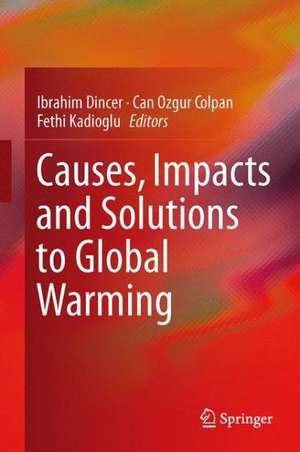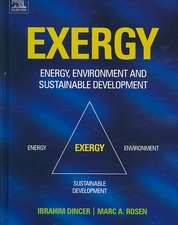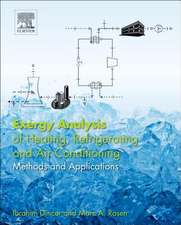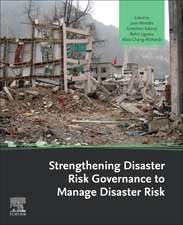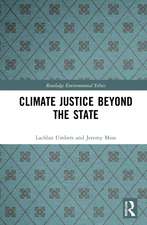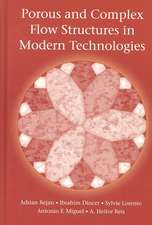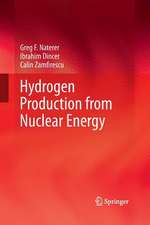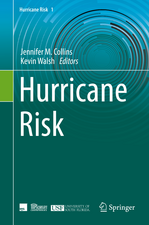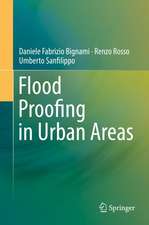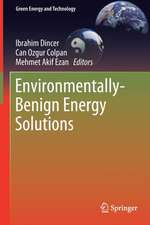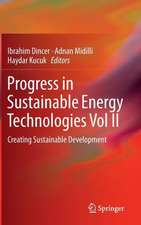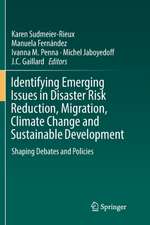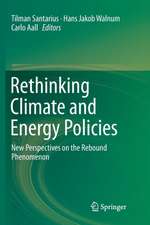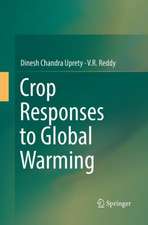Causes, Impacts and Solutions to Global Warming
Editat de Ibrahim Dincer, Can Ozgur Colpan, Fethi Kadiogluen Limba Engleză Hardback – 29 oct 2013
Preț: 1273.28 lei
Preț vechi: 1552.78 lei
-18% Nou
Puncte Express: 1910
Preț estimativ în valută:
243.72€ • 264.82$ • 204.86£
243.72€ • 264.82$ • 204.86£
Carte disponibilă
Livrare economică 31 martie-14 aprilie
Preluare comenzi: 021 569.72.76
Specificații
ISBN-13: 9781461475873
ISBN-10: 1461475872
Pagini: 954
Ilustrații: XVIII, 1183 p. 477 illus., 276 illus. in color.
Dimensiuni: 155 x 235 x 53 mm
Greutate: 2.04 kg
Ediția:2013
Editura: Springer
Colecția Springer
Locul publicării:New York, NY, United States
ISBN-10: 1461475872
Pagini: 954
Ilustrații: XVIII, 1183 p. 477 illus., 276 illus. in color.
Dimensiuni: 155 x 235 x 53 mm
Greutate: 2.04 kg
Ediția:2013
Editura: Springer
Colecția Springer
Locul publicării:New York, NY, United States
Public țintă
ResearchCuprins
Part. 1.Causes and Impacts.- Vegetation at Northern High Latitudes under Global Warming.- Exceptionally hot summers months in Central and Eastern Europe during the years 1951-2010.- Spatial Correlations and Distributions of Heating and Cooling Degree-day Normals in Turkey.- Use of Empirical Regression and Artificial Neural Network Models for Prediction of Global Solar Radiation in Dubai, UAE.- Turkish Water Foundation Climate Change Downscaling Model Principles.- Climate Change Expectations in the Next Half Century of Turkey.- Environmental pollution by organic contaminants as the contributors of the global warming.- Assessment of Vulnerability to Climate Change Using Indicators: Methodological Challenges.- Investigating the Climate Change Impacts On The Water Resources Of The Konya Closed Basin Area (Turkey) Using Satellite Remote Sensing Data.- Trend Analysis of Rainfall in North Cyprus.- Forecasting Tropical Storms in the Eastern Region of the United Arab Emirates: Lessons Learnt from Gonu.- Future Challenges in Urban Drainage Systems under Global Warming .- Preliminary analysis on phenological data of plants in an urban environment.- Impacts of Climate Change on Cereal Production in the Setif High Plains (North-East of Algeria).- Environmental Impact of Soil Microorganisms on Global Change.- Environmental Consciousness of Local People of Yakutia under Global Climate Change.- Environmental Impact Assessment of Explosive Volcanoes: A Case Study.- Probabilistic Health Risk Assessment of PCDD/Fs in Vegetable Foods at Highly Polluted Area in Turkey.- Selenium Adsorption on Activated Carbon by Using Radiotracer Technique.- Teaching the carbon cycle using IBL in the secondary schools.- BTEX in the exhaust emissions of motor vehicles.- Construction Criteria for the Sustainable Ecosystem.- Part 2. Potential Solutions.- An Approach to Assessment of Sustainability of Energy Systems.- Comparative Environmental Impact and Sustainability Assessments of Hydrogen and Cooling Production Systems.- Integration of Cu-Cl Cycle of Hydrogen Production With Nuclear and Renewable Energy Systems For Better Environment.- Comparative Environmental Impact Assessment of Nuclear-Based Hydrogen Production via Mg-Cl and Cu-Cl Thermochemical Water Splitting Cycles.- Large Scale Photo-reactors for Environmentally-Benign Solar Hydrogen Production .- Comparative Environmental Impact Evaluation of Hydrogen Production Methods from Renewable and Non-Renewable Sources.- Current Status of Fabrication of Solid Oxide Fuel Cells for Emission-free Energy Conversion.- Algae, Biofuels and Modeling.- Assessment of Sewage Sludge Potential from Municipal Wastewater Treatment Plants for Sustainable Biogas and Hydrogen Productions in Turkey.- Possibilities of Improving the Bioethanol Production from Corn Meal by Yeast Saccharomyces cerevisiae var. ellipsoideus.- Utilizing Bamboo Biochar for Carbon Sequestration and Local Economic Development.- The Integrated Solid Waste Management System: Its Implementation and Impacts Towards The Environment.- Modeling Anaerobic Digestion Process for Grass Silage After Beating Treatment Using Design of Experiment.- Biogas Potential of Animal Wastes for Electricity Generation in Ardahan City of Turkey.- Clean Technology for Volatile Organic Compound Removal from Wastewater.- Comparison of Thermal Properties and Kinetics of Selected Waste Wood Samples in Two Different Atmospheres.- Reducing Global Warming By Process Integration.- Environmental impact assessments of integrated multigeneration energy systems.- Integrated Renewable Energy Based Systems for Reduced Greenhouse Gas Emissions.- Exergetic and Environmental Impact Assessment of an Integrated System for Utilization of Excess Power from Thermal Power Plant.- Exergy Analysis and Environmental Impact Assessment of a Geothermal Power Plant.- Exergy Analysis and Environmental Impact Assessment of Solar Driven Heat Pump Drying Systems.- Regional Energy Planning Tool for Renewable Integrated Low-Energy District Heating Systems – Environmental Assessment.- Exergy Analysis and Environmental Impact Assessment of Using Various Refrigerants for Hybrid Electric Vehicle Thermal Management Systems.- Green Building Approach in Turkish Aviation Sector.- Assessment of energy efficiencies and environmental impacts of Railway and Bus Transportation Options.- A Change in the Transportation Needs Today, a Better Future for Tomorrow – Climate Change Review.- Emission Analysis of a Commercial Aircraft for Different Ranges.- Effect of Cavitation in Ships on the Environment.- Effective Ship Ballast Water Treatment System Management.- Coal as a component of Sustainable Energy portfolio.- Adsorption Capacity, Towards Carbon Dioxide, of A Chemically Activated Coal.- Integrated Coal Power Plant and Cu-Cl water splitting cycle for Greenhouse Gases Reduction.- Potential Methods for Converting Coal into Gasification Products for Reduced Global Warming.- Experimental and Theoretical Analysis of Evapotranspiration in Green Roof Systems.- New Parameters for Reduction of Heating Based Greenhouse Gas Emissions: A Case Study.- Environmental Impact Assessment of Building Energy Systems.- Environmental Impact Assessment of Various Energy Storage Options for Buildings.- Comparative Environmental Impact Assessment of Residential HVAC Systems.- Comparative Assessment of Costs and CO2 Emissions for Various Residential Energy Options.
Textul de pe ultima copertă
This book covers all aspects of global warming including its causes, impacts, and engineering solutions. This book also focuses on energy management and conservation strategies for better utilization of energy sources and technologies in various sectors, ranging from industrial to residential as well as transportation. It provides ways of improving energy efficiency at the end use. In order to reduce the negative effects of global warming due to excessive use of fossil fuel technologies, the following alternative technologies are introduced from the engineering perspective: fuel cells, solar power generation technologies, energy recovery technologies, hydrogen energy technologies, wind energy technologies, geothermal energy technologies, and biomass energy technologies. These technologies are presented in detail with novel ideas, modeling studies, systems development, case studies, illustrative examples, pilot and large-scale applications, and many more as what makes this book a unique and special one.
This book also:
Covers all the aspects of global warming from its causes and impacts, to engineering solutions
Presents green technologies in detail, including case studies
Discusses energy and environment policies and strategies to reduce the effects of global warming
Offers substantial views and assessment criteria and parameters for sustainable development
Brings us some potential life cycle assessment tools for cradle to grave type analyses
Uses exergy analysis as a key methodological tool for system design, analysis, assessment and improvement
Causes, Impacts and Solutions to Global Warming is an ideal book for students, lecturers, researchers, scientists, engineers, and policy makers interested in more in-depth information on global warming.
This book also:
Covers all the aspects of global warming from its causes and impacts, to engineering solutions
Presents green technologies in detail, including case studies
Discusses energy and environment policies and strategies to reduce the effects of global warming
Offers substantial views and assessment criteria and parameters for sustainable development
Brings us some potential life cycle assessment tools for cradle to grave type analyses
Uses exergy analysis as a key methodological tool for system design, analysis, assessment and improvement
Causes, Impacts and Solutions to Global Warming is an ideal book for students, lecturers, researchers, scientists, engineers, and policy makers interested in more in-depth information on global warming.
Caracteristici
Covers all the aspects of global warming from its causes and impacts, to engineering solutions
Presents green technologies in detail, including case studies
Discusses energy and environment policies and strategies to reduce the effects of global warming
Presents green technologies in detail, including case studies
Discusses energy and environment policies and strategies to reduce the effects of global warming
